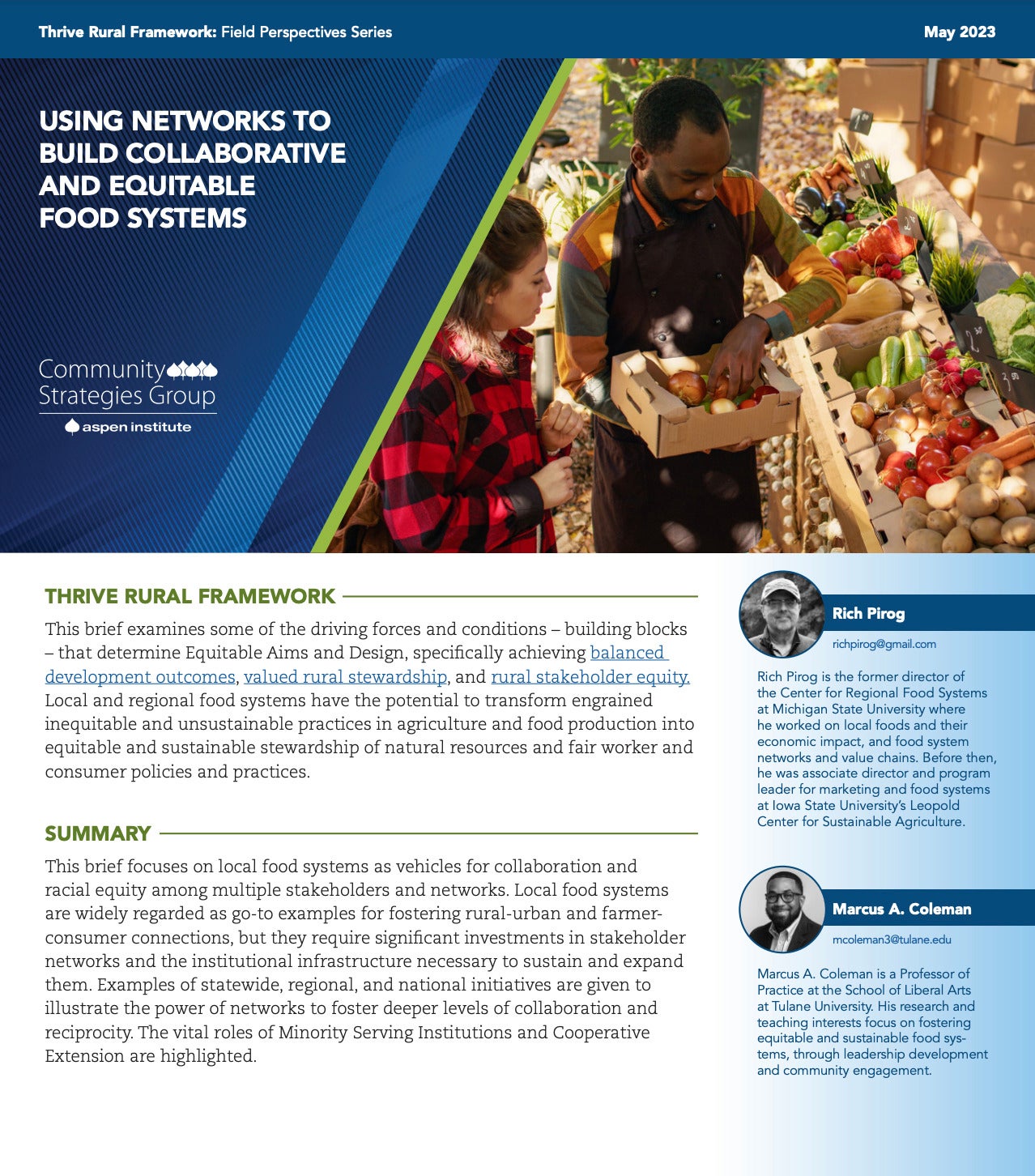In cities across America, hunger is not distributed equally. A long history of racialized policies and infrastructure guiding city planning and design have limited economic opportunity and food access in communities of color, creating neighborhoods where affordable, healthy food is scarce. In this session, we examined how America’s history of unequal housing and urban development have contributed to food insecurity. We also heard from the community leaders who are redesigning cities and neighborhoods to ensure that all people have access to healthy, affordable food.
Conversations on Food Justice is a collaboration between Food & Society at the Aspen Institute and Share Our Strength.
Our panelists include:
 Keith Carr is the Senior Manager, Policy and Government Relations at City Harvest. He works to advance the organization’s hunger, food insecurity and food access policy priorities and keeps abreast of timely city, state and federal policies and proposed legislation and their implications on City Harvest’s clients, our food pantry and soup kitchen partners and the communities we serve, and works to develop advocacy strategy around key issues.
Keith Carr is the Senior Manager, Policy and Government Relations at City Harvest. He works to advance the organization’s hunger, food insecurity and food access policy priorities and keeps abreast of timely city, state and federal policies and proposed legislation and their implications on City Harvest’s clients, our food pantry and soup kitchen partners and the communities we serve, and works to develop advocacy strategy around key issues.
Prior to joining City Harvest, Keith consulted for small businesses and nonprofits, community-based organizations, and cultural arts groups. He provided them with strategic planning, fund development and marketing solutions, as well as advising on board and organizational development. He has also worked with the Brooklyn Chamber of Commerce, Brooklyn Borough President Marty Markowitz, and the Office of Minority Health at the NYC Department of Health, and served as Senior Advisor on Economic Development to State Senator Kevin Parker.
Keith studied economics and marketing at the University of Connecticut and has completed the Columbia Business School’s Developing Leaders Program for Nonprofit Professionals.
He has lived in Brooklyn for 33 years. Originally from Hartford, CT, Keith spent his childhood summers on his grandparents’ farm in northeastern Connecticut where they grew the best Silver Queen corn, Kentucky Wonders, collards and callaloo you have ever tasted.
 Dr. Ashanté Reese is assistant professor of African and African Diaspora Studies at The University of Texas at Austin. She earned a PhD in Anthropology from American University and a bachelors of arts in History with a minor in African American studies from Trinity University in San Antonio, Texas. Broadly speaking, Dr. Reese works at the intersection of critical food studies and Black geographies, examining the ways Black people produce and navigate food-related spaces despite anti-Blackness. Animated by the question, who and what survives?, much of Dr. Reese’s work has focused on the everyday strategies Black people employ while navigating inequity. Her first book, Black Food Geographies: Race, Self-Reliance, and Food Access in Washington, D.C., takes up these themes through an ethnographic exploration of anti-Blackness and food access. Black Food Geographies won the 2020 Best Monograph Award from the Association for the Study of Food and Society. Her second book, Black Food Matters: Racial Justice in the Wake of Food Justice, is a collection co-edited with Hanna Garth that explores the geographic, social, and cultural dimensions of food in Black life across the U.S. Her work has been supported by the National Science Foundation, the Woodrow Wilson Foundation, and the Mellon foundation and has been published in a variety of academic and public venues: Antipode, Human Geography, the Oxford American, and Gravy Magazine among others.
Dr. Ashanté Reese is assistant professor of African and African Diaspora Studies at The University of Texas at Austin. She earned a PhD in Anthropology from American University and a bachelors of arts in History with a minor in African American studies from Trinity University in San Antonio, Texas. Broadly speaking, Dr. Reese works at the intersection of critical food studies and Black geographies, examining the ways Black people produce and navigate food-related spaces despite anti-Blackness. Animated by the question, who and what survives?, much of Dr. Reese’s work has focused on the everyday strategies Black people employ while navigating inequity. Her first book, Black Food Geographies: Race, Self-Reliance, and Food Access in Washington, D.C., takes up these themes through an ethnographic exploration of anti-Blackness and food access. Black Food Geographies won the 2020 Best Monograph Award from the Association for the Study of Food and Society. Her second book, Black Food Matters: Racial Justice in the Wake of Food Justice, is a collection co-edited with Hanna Garth that explores the geographic, social, and cultural dimensions of food in Black life across the U.S. Her work has been supported by the National Science Foundation, the Woodrow Wilson Foundation, and the Mellon foundation and has been published in a variety of academic and public venues: Antipode, Human Geography, the Oxford American, and Gravy Magazine among others.
Currently, Dr. Reese is working on a project tentatively titled, The Carceral Life of Sugar in which she explores the spatial, economic, and metaphorical resonance of the plantation in the early 20th century convict lease system in Texas and the ongoing carceral significance of sugar in everyday (Black) life.
 Richard (Dick) Sadler, PhD, MPH, is an associate professor in the Department of Public Health at Michigan State University. He is an urban/medical geographer with expertise in environmental science, GIS, food systems planning, and land use policy in legacy cities. His research interests include integrating urban planning and public health topics related to neighborhood/built environmental effects on health. Recently, this has revolved around uncovering elements of structural racism in the housing environment and determinants of urban development that exacerbate racial and socioeconomic inequality. Methodologically, Dr. Sadler combines spatial analysis and community-based participatory research approaches to address challenges in the urban environment. While his research focus remains on his hometown of Flint, Michigan, he aims to use the lessons learned from this work to bring a unique lens to existing collaborations in Baltimore, Pittsburgh, Milwaukee, Grand Rapids, Ontario, and beyond. Some of his service contributions include serving on the boards of Edible Flint, the Flint Fresh Food Hub, the Flint & Genesee Food Policy Council, and the Flint Mission Zone of the United Methodist Church (which runs the South Flint Soup Kitchen). Throughout his work, the overarching goal is to strengthen the understanding between the built environment and health behaviors/outcomes with the objective of shaping land use policy to build healthier cities.
Richard (Dick) Sadler, PhD, MPH, is an associate professor in the Department of Public Health at Michigan State University. He is an urban/medical geographer with expertise in environmental science, GIS, food systems planning, and land use policy in legacy cities. His research interests include integrating urban planning and public health topics related to neighborhood/built environmental effects on health. Recently, this has revolved around uncovering elements of structural racism in the housing environment and determinants of urban development that exacerbate racial and socioeconomic inequality. Methodologically, Dr. Sadler combines spatial analysis and community-based participatory research approaches to address challenges in the urban environment. While his research focus remains on his hometown of Flint, Michigan, he aims to use the lessons learned from this work to bring a unique lens to existing collaborations in Baltimore, Pittsburgh, Milwaukee, Grand Rapids, Ontario, and beyond. Some of his service contributions include serving on the boards of Edible Flint, the Flint Fresh Food Hub, the Flint & Genesee Food Policy Council, and the Flint Mission Zone of the United Methodist Church (which runs the South Flint Soup Kitchen). Throughout his work, the overarching goal is to strengthen the understanding between the built environment and health behaviors/outcomes with the objective of shaping land use policy to build healthier cities.
Moderated by
 Ken Kolb is a professor and the chair of the Sociology Department at Furman University in Greenville, South Carolina and an inaugural Aspen Food Leaders Fellow. Ever since returning from the Peace Corps in Paraguay to finish his Ph.D. in sociology, he has spent the past 20 years conducting community-based research by spending time with neighborhood groups and talking to people one-on-one. As an ethnographer seeking to facilitate social change, Kolb documents the everyday realities of struggling communities so that he can equip them with the data they need to convince their policymakers to take their complaints seriously. His most recent book, Retail Inequality: Reframing the Food Desert Debate, analyzes how institutionally racist infrastructure policies of the past created the disparities within our food systems today. In it, he argues that simply adding new grocery stores is not enough. Improving food access requires systemic change. Ken and his team recently published Racial Displacement in Greenville, SC: An Exploration of Historic and Current Population Shifts in the City of Greenville and Surrounding Greenville County.
Ken Kolb is a professor and the chair of the Sociology Department at Furman University in Greenville, South Carolina and an inaugural Aspen Food Leaders Fellow. Ever since returning from the Peace Corps in Paraguay to finish his Ph.D. in sociology, he has spent the past 20 years conducting community-based research by spending time with neighborhood groups and talking to people one-on-one. As an ethnographer seeking to facilitate social change, Kolb documents the everyday realities of struggling communities so that he can equip them with the data they need to convince their policymakers to take their complaints seriously. His most recent book, Retail Inequality: Reframing the Food Desert Debate, analyzes how institutionally racist infrastructure policies of the past created the disparities within our food systems today. In it, he argues that simply adding new grocery stores is not enough. Improving food access requires systemic change. Ken and his team recently published Racial Displacement in Greenville, SC: An Exploration of Historic and Current Population Shifts in the City of Greenville and Surrounding Greenville County.

